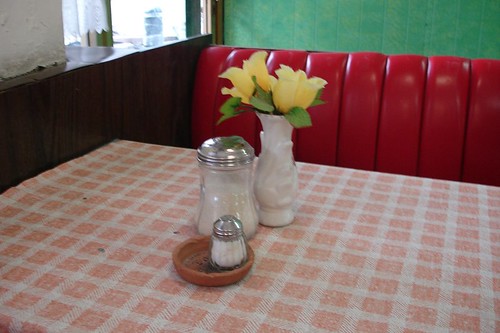
I love food. I'm a happy eater, and a less-than-happy yet genuinely enthusiastic cook. Only recently, though, have I started gaining a sort of food conscience. Food conscience growing up was more about knowing how to hold up my chopsticks properly, or being able to recognize a shallot, or learning to enjoy gross stuff like ants eggs (yes, we eat ants eggs in Mexico. We call them escamoles, and they're positively buttery and delicious). In any case, conscience was more of a snob thing than an actual curiosity or desire for knowledge about the stuff I was being fed.
Now that I'm older, though, not only do I care about what I cook or eat; I also try to worry about what goes onto my plate and how it gets there. I've tried to go organic, but in Spain it's still virtually impossible (organic food stores or markets rare here, and the prices are simply insane). I've tried to buy fresh produce in markets instead of supermarkets. Barcelona has wonderful food markets. But most of the tomatoes in the markets are also grown in those massive plastic-covered freak farms in Almería, and many of the fruits are imported from Brazil or India and the fish is sometimes frozen. I've begun to wonder how far a conscientious eater can really go, particularly in an urban setting.

Apparently pretty far. Take locavores, or local eaters. Yes, it's a proper word. But what does eating locally actually mean? Originally, it seems locavores should only eat food produced within a 100-mile radius of their home. Details and hidden agendas aside, a very good case has been made against this hardcore notion of eating local, in its own terms. It turns out that eating local can actually be less sustainable than eating food from the other side of the equator (click to read why).
Again, we're faced with one of the distortions of the localist rhetoric. It's one thing to support locally-oriented farmers markets or wanting to eat something that hasn't been radiated and tastes like plastic. I think initiatives like Fritz Haeg's Edible Estates or the various urban-farming movements taking over empty lots and fighting underemployement are great. But this sort of initiative can only cover a fraction of our needs, and can only work under very specific conditions. Why not make a call for eating consciously instead of only locally?

6 comments:
"Eating consciously" is pretty vague. If you took a poll of whether people consider themselves conscious of what they eat, you'd probably be close to 100%.
On the other hand, 100 miles is an unavoidable fact, and I think that is why some have set this forth as a laudible goal. Nobody believes a carrot from 99 miles away is that much more sustainable than one from 101 miles. It's an objective benchmark, an anchor point in a world in which "natural" and "healthy" and "humane" and even "organic" are pretty much broken language.
More on why food localism is not important for the reasons typically given (reducing carbon emissions) at gristmill:
That is to say: Eating local out of concern over carbon emissions is misguided. Food travel is not a big part of America's collective emissions or most individuals' emissions. And miles traveled is not always a reliable indicator of emissions -- hothouse vegetables grown locally may be responsible for more emissions than traditionally grown veggies flown overseas.
Ezra Klein also had a good post on the topic recently, complete with chart illustrating the relative unimportance of transport in making food unsustainable.
That said, it remains true that both foodie reasons ("Local food tastes better") as well as Wendell Berry-ish reasons ("I enjoy eating locally because it connects me to the seasonal rhythms of the place I live in" or "I think constructing a more localized economy is vital to the health and well-being of my community") for food localism remain (at least potentially) valid.
I agree that the emissions calculations are dicey. I read somewhere that carting small amounts of food around in pick-up trucks isn't that much different from aggregating large amounts of food into 18-wheelers and sending it across the country.
But I also agree that the Wendell Berry "know your farmer" angle is important here. Food can be an entry point into an alternative worldview from the global consumer capitalism evident in the supermarket (branding everywhere, value-added processing, no connection to place or time, etc.). To the extent that buying locally grounds us in the land (and not just land in the abstract, but this land) and a community of people we know in reality, it can lead to lifestyle changes that do have an impact on the environment and health.
oh yeah. Almost forgot. Local food has positive land use implications. Farms would be encouraged to occupy land around metro regions, making it easier to curb sprawl through an urban growth boundary greenbelt. Easier than with giant monoculture farms in Nebraska.
Also, localism would encourage smaller-scale farms, which lead to better production practices. The movement toward chemical farming was driven by the economy of scale, not so much technological advances. And the closer connection allows consumers more transparency to aid their food choices.
Thanks for the comments guys.
I think "eating consciously" should be understood as wanting to know more about what we actually eat, regardless of where it comes from.
I agree that one of the virtues of the eat local movement is that it has gotten people to actually take a moment to think about what they put in their mouths, and understand how its tied to both local and faraway economies (as opposed to the eat-healthy or calorie count fads of earlier decades).
I think that demanding clear information on what we consume should become a sort of prerogative, and that the eat local movement definitely deserves some points for putting this on the agenda.
I like the idea of food connecting to place and community, but again, with the global piercing the local constantly. Some locavores mention immigrant farmers bringing in "exotic" produce to the local arena. I love that New York now has a "local" Poblano cuisine scene. But what if you can't grow chiles in upstate New York? Maybe the inflexible 100-mile radius could be broadened to some specific farming community in southern Mexico, tied to the local food producers. I don't know.
The thing I'm not totally convinced of is this idea of the self-sufficient, isolated nuclei.
I just remembered this really cool project I read about, called Background Stories by graphic designer Arlene Birt. She proposes to include simple diagrams or illustrations on product packaging that trace the "journey" of a product from the farm or wherever to the counter. Check it out:
http://www.backgroundstories.com/
"
The thing I'm not totally convinced of is this idea of the self-sufficient, isolated nuclei"
Yeah, I hear you on that.
Post a Comment